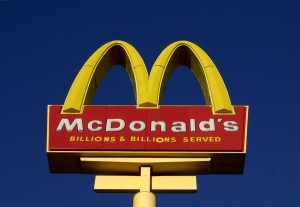 Parents tend to underestimate the calorie content in their kids’ fast food meals, according to the findings of a study presented last week at the Annual Meeting of The Obesity Society. Several studies have shown that adults underestimate calories in their own meals at fast food restaurants. However, no studies have yet shown how well parents estimate the calorie content of their kids’ fast food meals.
Parents tend to underestimate the calorie content in their kids’ fast food meals, according to the findings of a study presented last week at the Annual Meeting of The Obesity Society. Several studies have shown that adults underestimate calories in their own meals at fast food restaurants. However, no studies have yet shown how well parents estimate the calorie content of their kids’ fast food meals.
The new study involved 330 children (ages 3-15) and their parents. Of the group, 57 percent of the children were overweight or obese. The children were ethnically diverse – 33 percent black, 30 percent Hispanic, 19 percent white, 3 percent Asian, and 15 percent other or multiracial. The researchers visited 10 restaurants in each of four New England cities: three McDonald’s, three Burger King, two Subway, one KFC, and one Wendy’s. Each restaurant was visited six times at dinnertime.
The researchers found that many of the parents purchased large meals for their children; the average meal that the children received for dinner contained 733 calories. The parents estimated that the meals contained an average of just 562 calories. Of the parents, 72 percent underestimated the calorie content of their children’s meals, with 24 percent underestimating by at least 500 calories. “There was an association between larger meals and larger underestimations, which may hold some promise for menu labeling”, said lead researcher, Jason Block, MD, of Harvard Medical School. Interestingly, the parents underestimated at all chains except KCF. On average, the largest underestimation was at Burger King, followed by Subway, Wendy’s, and McDonald’s. Dr. Block added that a limitation of the study was that they were measuring the calorie content of the meal purchased, but couldn’t measure actual consumption.
Many of the calories consumed at fast food restaurants are via sugar-sweetened beverages. Kids age 2 – 19 consume about 7.2 trillion calories in sugar sweetened beverages per year. Other new research presented at the Annual Meeting showed that overweight kids who replaced their usual sugary beverages with water or other calorie-free drinks gained less weight than their peers who continued drinking sweetened beverages. If kids were to replace the soda and sugar-sweetened beverages with water, it could skim as much as 100 calories or more from their fast food meals.
Pediatric obesity costs about 3 billion per year, according to William Dietz MD, PhD who is the Former Director of the Division of Nutrition, Physical Activity, and Obesity at the Centers of Disease Control and Prevention (CDC). Studies such as these highlight the importance of parent education in addressing and reversing this expensive and complex health threat. We asked Dr. Marina Kurian, Medical Director of NYU Langone Weight Management Center, about her thoughts on the fast food study. “This study, along with the findings of the sugary beverage study, represent a wake up call to all of us,” Kurian said. “Fast food restaurants are used by so many of us because of convenience, and unfortunately it comes at a cost. With childhood obesity continuing to rise, it is imperative for us to have the best idea of what we are giving our children. Prevention is the goal and it has to start with smarter choices. Food labeling as initiated by New York and California is an excellent way to help everyone – and especially parents – keep track of the healthier choices and may be the best way to help in the fight against obesity.” Further information on how parents can be involved in reducing obesity is available here.






Nutrition & Lifestyle